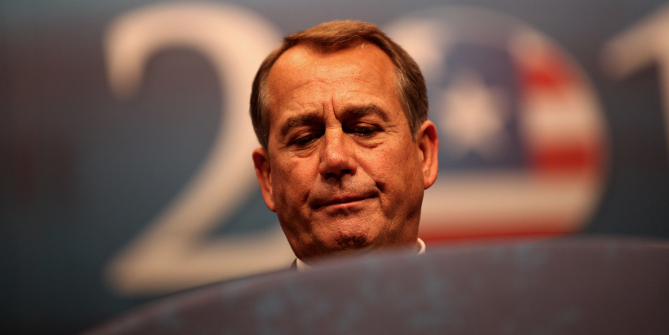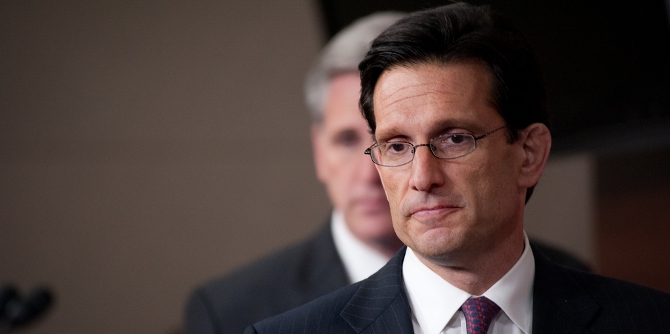USAPP Managing Editor, Chris Gilson looks at the best in political blogging from around the Beltway.
Jump to
[one_half last=”no”]
The 2016 campaign and the Colorado and Wyoming Primaries
The Democratic Campaign and the Candidates
The 9th Democratic debate
The Republican Campaign and the Candidates
The Obama Administration
[/one_half][one_half last=”yes”]
The Beltway and the Supreme Court
Foreign policy, defense and trade
Obamacare and health policy
The economy and society
[/one_half]
The 2016 Campaign and the Colorado and Wyoming Primaries
On Saturday, American Thinker wonders what might happen if both the Republican and Democratic conventions in July nominate someone who hasn’t run in the primaries or the caucuses, something that might better reflect the current ‘anti-Establishment’ sentiment that now seems to be on the rise across the country. Speaking of sentiment, The Fix, meanwhile says that political polarization is getting worse – everywhere. Democrats really like President Obama, and Republicans really, really don’t. Such polarized opinions of presidents move in step with Congressional polarization as well.
Commenting on the presidential nomination race for both sides, Political Animal argues that this is no way to elect a president: the GOP convention may end up being an ‘insiders backroom brawl’, and the Democratic nomination may be decided by ‘high-level party insiders’ in the form of superdelegates. Outside the Beltway doesn’t seem to mind that the delegate allocation process is ‘undemocratic’ – political parties are private organizations, after all and should be able to select delegates and candidates as they see fit. Caffeinated Politics reckons that the general confusion over how convention delegates are selected is down to Americans’ lack of civics education.
Winning primary states shows that a candidate might do well in the general election, right? Wrong says The Fix; history shows us that there’s no pattern to winning states in the primary and then the general.

On Tuesday, American Thinker wonders if ‘dark red Ted [Cruz]’ could defeat ‘dark purple Hillary [Clinton]’ in November. They say that on tone and image, it’s a tie between the two; Cruz wins on ‘family matters’ business issues, repealing Obamacare, not being under investigation, foreign policy, and favorability, while Clinton wins on immigration, gender, and Americans’ love for government.
PoliticusUSA says this week that a significant number of Republicans are now saying that they would vote for Hillary Clinton if Donald Trump is the nominee. Could The Donald cause a Democratic landslide? Powerline meanwhile writes that big defeats in presidential races are awful, but not disgraceful. They argue that it would be better to lose with Cruz given that Donald Trump would be a disgraceful nomination for the presidency.
Turning to down ballot races in this year’s election, Smart Politics says that even though filing deadlines are mere days away, Democrats in Alaska and Oklahoma, and Republicans in Hawaii and Vermont do not have any candidate for this year’s US Senate races. Sabato’s Crystal Ball looks at the Democrats’ chances in the House of Representatives this fall, writing that a relatively large wave could turn some supposedly safe GOP seats; a 3 point increase compared to the 2012 result could raise the Democrats’ net advantage to 35 seats. The Fix, meanwhile says that 54 may be the magic number House Democrats need to win back the majority – that’s the percentage of the vote that Hillary Clinton would need to get for the party to take the aforementioned 35 House seats.
Colorado and Wyoming
On Saturday, PoliticusUSA previews the Wyoming Caucus, writing that it takes places as both Bernie Sanders and Hillary Clinton gear up for the all-important New York Primary on April 19th. Post Politics writes that Sanders has now defeated Hillary Clinton in the past seven of eight states which have had nominating contests – though through a quirk of the Wyoming Caucus rules, his victory of 55.7 percent only translated into half (7) of the state’s delegates.
After Wyoming’s Democratic Caucus and Colorado’s delegate selection contest, The Atlantic reports that Sanders has won the former, and Texas Senator Ted Cruz, the latter. RedState says that Donald Trump’s campaign was ‘tripping over their shoelaces’ in Colorado, handing out fliers with the incorrect delegate numbers for listed names.
The Democratic Campaign and the Candidates
On Saturday, Townhall looks at both Hillary Clinton and Bernie Sanders, writing that Sanders doesn’t really understand the Democratic Party if he us questioning how Clinton can take millions in contributions from Wall Street and still claim to represent working families. They argue that Clinton’s behavior is really no different to many Democrats who have preceded her, and that Democrats who govern
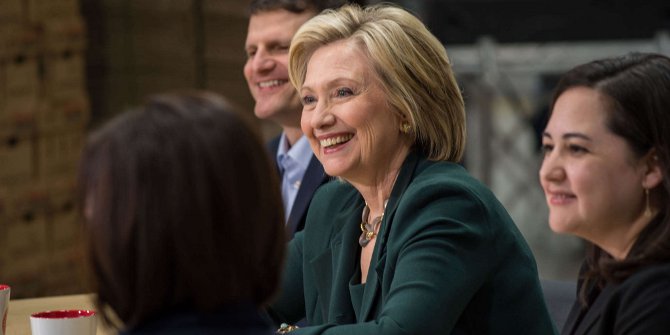
actually do little to assist the communities of interest they claim to represent. The Fix wonders Wednesday what might happen if the Democrats’ superdelegates had to vote for the candidate who won their state. If superdelegates were proportionally apportioned in this way, then Clinton would still be in the lead, though by less.
Given the seeming growing animosity between Clinton and Sanders, Daily Kos contemplates whether the Democratic primary will implode in much the same way that the Republican race has. Many had thought that the race was essentially going to be a coronation for Clinton, but there now seems to be the possibility of a contested convention for the party. Townhall says that if there’s one thing that Democrats know how to do, it’s to throw a convention which turns into a total riot, something that is looking more likely given what they say seem to be the growing divisions within the party.
Daily Kos looks at how the Democratic Party can achieve more success in down ballot races. They reckon that not only does the party need to get out the vote, it also needs to get people to run for public office in the first place. Powerline, meanwhile writes that the Democrats’ ‘dust-up’ in Maryland over that the nomination for the party’s Senate primary is a sign of things to come. Representatives Chris Van Hollen and Donna Edwards are facing one another, with Edwards attacking Van Hollen as being insufficiently left wing.
The 9th Democratic debate
Ahead of the all-important New York Primary on April 19th, Bernie Sanders and Hillary Clinton went head to head in the 9th Democratic debate Thursday night. Ahead of the debate, The Atlantic writes that we should expect a contentious debate given that tensions have been running high between the two candidates over who is more qualified to win the presidency.
The debate was indeed heated – Crooks & Liars reports that host Wolf Blitzer of CNN had to tell both of the candidates to ‘stop screaming’ while they were debating the merits of the minimum wage. PoliticusUSA reckons that Clinton was the big winner of the debate, by playing up her knowledge and history as the Empire’s State’s Senator. The Atlantic comments that Sanders had a strong, though risky debate in New York. Risky, because of his argument on the Israeli-Palestine conflict, which was critical of Israel.
Moving on to what the two candidates have been up to this past week:
Hillary Clinton
- Clinton isn’t qualified to be president. Deal with it (The Federalist)
- Clinton has a hypocritical stance on school choice (American Thinker)
- Why Clinton’s campaign has not had a good couple of weeks on race relations (The Atlantic)
- Clinton and the Democratic Party are joining together to sue Arizona over access to the polls following the state’s presidential primary last month that saw long waits (Crooks & Liars)
- Despite her travails, Clinton is still not loathed by Democrats in the way that Donald Trump and Ted Cruz are by their own parties (No more mister nice blog)
- Hillary Clinton will face questions over her links to Wall Street if she gets the nomination, as well as questions about her trust and credibility (TMP)…
- …especially since she may have earned more in one Wall Street speech than Sanders made in an entire year (PoliticusUSA)
- What Clinton actually thinks about the minimum wage (Wonkblog)
- If Clinton is running for what would be Obama’s ‘third term’, here are the challenges that she faces (Monkey Cage)
- In the primary race, Clinton is winning the states that look the most like the Democratic party (FiveThirtyEight)
Bernie Sanders
-

Credit: Bob Simpson (Flickr, CC-BY-NC-SA-2.0) If Sanders doesn’t win the nomination, then what’s the future of his movement? Possibly as an opposition force against a President Trump or Cruz (The Atlantic)
- Sanders this week joined a picket line of Verizon workers (Crooks & Liars)
- Sanders is having an argument with himself about lawsuits against gun manufacturers’ over gun deaths (Hit & Run)
- It also turns out that Sanders is fundraising for candidates who are running against gay men. Does this matter? (Americablog)
- How Sanders’ writing off of Southern voters is a key weakness for his campaign (The Atlantic)
The Republican Campaign and the Candidates
This week FiveThirtyEight has a roadmap for the rest of the GOP primary race, writing that it could all come down to 53 ‘micro-primaries’ in California on June 7.
On Saturday, Outside the Beltway writes that delegate battles could make for a contentious convention in Cleveland this July. So far Trump’s campaign has shown an inability to meaningfully affect how states select their delegates, which could lead to problems for him if he does not gain the nomination at the first ballot. Powerline meanwhile wonders if the convention will be a rerun of 1976, where the nomination of Gerald Ford hung in the balance right up until the week before the convention. They say that while Ronald Reagan’s announcement of his running mate didn’t help him, it could help Ted Cruz this year, especially if it was someone like South Carolina Governor Nikki Haley, who would generate some excitement. On Thursday, Monkey Cage writes that there’s one simple way to minimize chaos at the Republicans’ convention: using instant-runoff voting. RedState reminds us on Thursday that many of Florida Senator Marco Rubio’s delegates will be up for grabs on the first convention ballot.

Speaking of Trump, or rather his opponents, No more mister nice blog reports that in the polls ‘Not-Trump’ is doing fine, with 66 percent of GOP voters saying they would support the candidate who eventually wins the nomination, Trump or not. For many in the GOP that ‘Not-Trump’ should in fact be House Speaker Paul Ryan (WI); he is generally seen as a levelheaded answer to the GOP’s presidential primary woes. Ryan scotched these thoughts this week, by announcing that he would not accept the party’s nomination. The Atlantic says that even despite his refusal, the dream of a Ryan candidacy will likely remain a specter over the Republican race. Outside the Beltway comments that both Trump and Cruz are viewed very badly outside the GOP, something that does not bode well for the party come November. The Atlantic looks at a new study which shows that Ohio Governor John Kasich may be the only Republican who could actually defeat Hillary Clinton. The only thing is, is that he will likely never have a chance to do it. Even though Trump is deeply unpopular outside of the GOP, Ten Miles Square says that the party might be stronger with him than without. Also talking about the wider GOP, FiveThirtyEight has the news that a large number of party leaders aren’t making presidential endorsements this year.
This year has seen the increase in premature deaths among poor whites in recent decades gain prominence in the media. Political Animal says that the phenomenon goes some way towards describing the current crackup of the GOP, with areas with higher white death-rates more likely to support Donald Trump. Tropics of Meta, meanwhile looks at how uninformed much of the American electorate is (given their support for Donald Trump). They say that Trump’s popularity is the result of the GOP’s ‘cultivation of ignorance’ over the past eight years.
Turning now to the GOP’s candidates, and beginning with The Donald:
Donald Trump
- A fight broke out this week at a Trump rally, with a black protester being attacked (Crooks & Liars)
- This may be a shape of things to come, with Trump supporters threatening delegates for the Cleveland convention (The Lonely Conservative)
- Trump’s campaign manager, Corey Lewandowski won’t face battery charges against Breitbart reporter Michelle Fields (RedState)
- It turns out that Trump may have paid for a marketing campaign involving fake Twitter followers or ‘Trumpbots’ (PoliticusUSA)
- Trump was getting trounced in Indiana even before the state voted (FreakOutNation)
- New York polling is also looking disappointing for Trump (RedState)…
- … though he has been defending ‘New York values’ there (Post Politics)
- How Trump made a mistake by overlooking Colorado (FiveThirtyEight)
- Colorado also proves that Trump would be unable to handle the rigors of a campaign (The Federalist)
- Trump is whining about the unfairness of a delegate system that actually gives him a 22 percent bonus (The Lonely Conservative)
-

Donald Trump Credit: Darron Birgenheier (Flickr, CC-BY-SA-2.0) The blame for the ‘rigged’ system which Trump has been complaining about actually lies with him (Outside the Beltway)
- The Republican National Committee (RNC) this week told Trump that the delegate selection process is actually quite easy to understand (Post Politics)
- It’s now ‘all-out-war’ between Trump and the RNC (Daily Kos)
- Will the GOP choose to risk the wrath of Trump’s voters by not nominating him in July? (Political Animal)
- Could Senators Jeff Sessions (AL) or Tom Cotton (AK) end up being Trump’s Vice President? (Crooks & Liars)
- Donald Trump is the weakest GOP frontrunner of the modern era (FiveThirtyEight)…
- … which may be a contributing factor as to why he can’t win this November if he gains the nomination (RedState)
- Trump isn’t very good on policy details, but he’s very precise about managing GOP party factions (Mischiefs of Faction)
- Trump isn’t a narcissist – he just plays one on TV (American Thinker)
- Is Trump a political descendant of former Nixon Vice-President Spiro T Agnew? (American Thinker)
- Are we now seeing ‘Trumpmentum’ which might see him secure his needed 1,237 delegates ahead of the convention? (TPM)
Ted Cruz
- The Texas Senator did well in Colorado this week – he’ll likely shut out Trump in Indiana as well (RedState)
- Is Ted Cruz fueling Islamophobia to a greater degree than Donald Trump? (Informed Comment)
- Is this the week that Cruz won the GOP nomination? (RedState)
- Is the ice between Cruz and GOP leaders now thawing? (Townhall)
- Why the GOP’s elites should unite for Cruz now, lest he comes back stronger in 2020 (The Atlantic)
- Cruz is actually in favor of ending the federal criminalization of marijuana (RedState)
- Cruz’s attack on Hillary Clinton this week backfired on him – it brought his own unfavorable ratings to peoples’ attention (Americablog)
- Another Cruz ‘birther’ case was thrown out this week, this time by a federal judge in Texas (RedState)
John Kasich
- Is the Ohio Governor only staying in the GOP nomination race in order to do Donald Trump’s bidding? (RedState)
- Kasich’s survival strategy is to stick it out and hope that he has some influence on the convention in July (The Atlantic)
- Kasich has been thriving in New York with the temporary hibernation of the #NeverTrump movement (Post Politics)
The Obama Administration
President Obama let ‘his nerd flag fly’ this week, hosting the 6th annual White House Science Fair, and guest presenting five science news segments on a Fox News TV program, reports Political Animal.
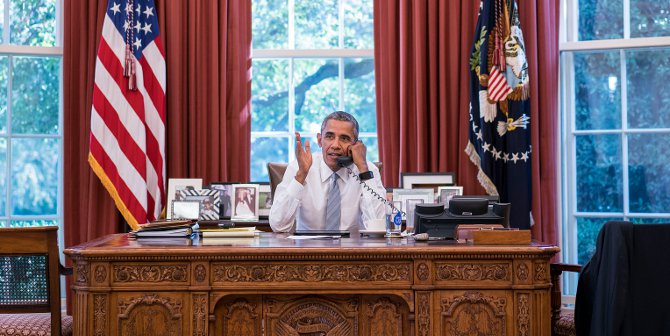
On Friday, American Thinker wonders what we should make of President Obama’s recent rise in the polls. They reckon that it might be ‘lame-duck fondness’ to some extent, and because much of the media are liberal Democrats as well.
The Daily Signal this week looks at what’s needed to roll back Obama’s regulatory regime, including new measures from the Environmental Protection Agency, They comment that it will need a new president, as well as keeping control of both houses of Congress to roll back such regulations.
On Friday, United Liberty has the news that the Obama administration is continuing in pushing for a bailout for the economically beleaguered territory of Puerto Rico. They say that the administration’s ‘cronies’ stand to make more than $100 million if the bankruptcy and bailout plan is put in place.
The Beltway and the Supreme Court
Hit & Run writes Wednesday on a new report from the Government Accountability Office (GAO) which shows the scale of federal government inefficiency. They say that the report shows that there are 37 different areas of government which could be run better, and up to $144 billion in potential savings to be made.
The Atlantic this week makes the case for a new Works Progress Administration – the government work program that helped millions during the Great Depression. They write that creating more subsidized employment programs could be a big step in boosting incomes and helping the poorest. One of the big arguments against such programs is that they help to expand the national debt. Wonkblog argues that we needn’t worry about growing government debts, and that the economy actually does worse when government restricts spending levels.
Moving on to the ongoing deadlock over appointing the ninth Supreme Court Justice, Powerline wonders if President Obama will be able to get his nominee, Merrick Garland, on the court without the Senate confirming him. They say that the argument made by some that the Senate has waived its right to ‘[give] advice and consent’ is unpersuasive, given that the body has done just that by effectively stating it will not consent to Garland’s appointment. On Monday, Outside the Beltway agrees with Justice Sonya Sotomayor, who in a recent speech stated that we would benefit from a more diverse Supreme Court.
Friday this week was the deadline for Congress to begin its annual spending process. Daily Kos says that while House Speaker Paul Ryan has talked about getting the House working again, he has done little to counter the House Freedom Caucus who want lower spending levels compared to those agreed last year. The Atlantic talks more on the broken budget process, writing that Senate Budget Committee Chairman, Mike Enzi (R-WY), is exploring how to fix it. They say that while many are open to reforms – especially Democrats – there is little optimism that Enzi will make any progress.
Foreign policy, defense and trade
On Thursday, The Atlantic writes that the current crop of presidential candidates just don’t seem to care about foreign policy – aside from Hilary Clinton. They write that the candidates’ indifference to foreign policy matters is surprising given that Americans place national security near the tops of their lists of the most crucial issues in this election cycle.
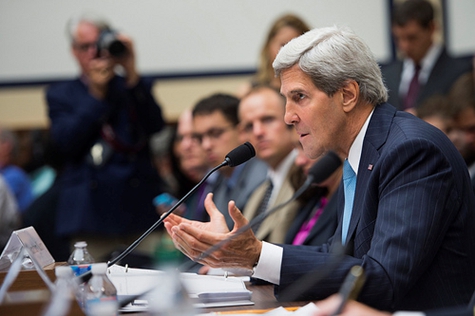
Secretary of State John Kerry recently visited Hiroshima, something which has prompted speculation that President Obama might do the same. Powerline reckons that such a visit might be part of an ‘Obama apology tour’, and argues that the US has nothing to apologize for in the context of the 1945 nuclear bombing of the city.
The Daily Signal this week writes that the US is looking to improve defense ties with India, with an agreement to share military logistics now on the cards announced as part of US Defense Secretary Ash Carter’s visit to India. FiveThirtyEight meanwhile looks at whether or not the then Secretary of State Hillary Clinton’s ‘pivot to Asia’ worked. They say that while the pivot has seen diplomatic and economic engagement, the administration’s lack of military engagement in the region has hurt the vision as a whole. Also taking on the pivot, The American Interest comments that there are continued signs that China is unimpressed by Obama’s ‘pivot’, as evidenced by the ongoing military buildup in the South China Sea.
On Friday, Political Violence @ a Glance looks at three lessons that can be learned from the failed US intervention in Libya five years ago – ‘follow up’ is critical, hope for the best – but plan for the worst, and that decapitation is not always effective.
Obamacare and health policy
On Tuesday, The Atlantic looks at the Obama administration’s offensive against the Zika virus, which at the moment mostly seems to consists of a political battle with House Republicans over appropriating $1.9 billion in emergency funding – funding that the GOP aren’t keen to release.
Turning now to Obamacare, The Federalist writes this week that despite Hillary Clinton’s claims, it’s still not working. They comment that the program is collapsing because Americans aren’t buying it, and that Clinton should take the time to understand why it isn’t working, if she wants to defend it. The American Interest reports this week that UnitedHealth Group has begun to make good on its earlier threat to
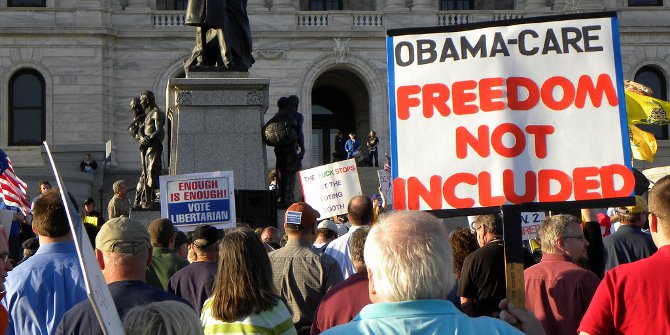
pull out from Obamacare, beginning with Georgia and Arkansas. The company has been losing millions in relation to its Obamacare business, a symptom of a system, they say, that did little to address the underlying issues affecting the healthcare system such as rising costs. Wonkblog makes a similar point – people are not warming up to Obamacare, though they are to the idea of healthcare reform in general. Political Animal, meanwhile says that contrary to what some say, Obamacare has put in place measures to tackle healthcare costs, such as a new program which will change the way that doctors and clinicians will treat more than 25 million patients by providing fixed monthly fees for each patient, rather than reimbursements per visit or procedure.
The economy is always an election issue, and in this year’s election, writes The Hill’s Congress blog, it means also talking about healthcare.
The economy and society
On Friday, The Atlantic looks at what caused the large falls in crime that the US has seen over the past 25 years. They say that it could be down to many factors including economic growth, falling alcohol consumption, more tough on crime policies, more imprisonment, and more abortions. Turning to one type of crime – hate crimes – Informed Comment says that there has been an 8-fold increase in Islamophobia crime in America since 2000.
Moving on to the economy, on Sunday, Political Animal comments that as the economy changes, making more jobs redundant through automation, our social guarantees will need to change as well, such as through the introduction of a universal basic income or a guaranteed work program.
The Atlantic looks at new research which shows that the life expectancy of the poorest Americans can be determined a great deal by where they live. They say that in these areas, the poor die earlier because they get sicker faster because of obesity, smoking, and a lack of exercise.
On Monday, The American Interest writes that the US is facing a public pension shortfall of $3.4 trillion, a figure which may lead to further bankruptcies by cities and municipalities who are simply unable to pay. Also very costly is corporate tax avoidance; The Atlantic says that America’s 50 largest companies have stored more than $1 trillion in offshore shell companies in order to lower their taxes.
Featured image credit: The White House
Please read our comments policy before commenting.
Note: This article gives the views of the author, and not the position of USAPP– American Politics and Policy, nor of the London School of Economics.
Shortened URL for this post: http://bit.ly/268U5KV



